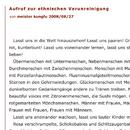
Always the same.
, by Frank HellenkampReading? On the internet?
We read an awful lot of things on our computer displays: emails, news, blogs, encyclopedias. But literature on the internet is still being treated with neglect (although there have been some attempts in this direction).
The sites that are moderately successful often belong to the fan-fiction genre that is generally not taken serious by the established cultural scene. As far as its literal value is concerned this may be spot on, as a social phenomenon though it should be taken more seriously.
»Die Zeit« recently complained in a dossier that not enough people read and that reader competence is dwindling. According to »Die Zeit« even books by Astrid Lindgren have to be simplified so that they can be read in certain schools.
One can take this seriously or one can rubbish it as exaggerated and a form of cultural war that has always been fought in some way. Alternatively one could just do what might be the most pragmatic and sensible thing: Read and write, develop ones language skills and ideally have a positive influence on others.
It's always the same.
immerdasgleiche.de is my own modest attempt to get people to take their time, to pause for a moment and to read and reflect upon “real language”, not only information that is easily digested.
The texts: most of them short (I call them »shorties«), some of them of medium length (e.g. »Das Hospiz«).
The layout: As simple as possible, black and white with a discrete navigation, completely scalable and with special print style sheets so that the texts can be printed out comfortably.
Some specific online features:
- Playing with the possibilities of using markup language: Bold and italic markups are displayed differently — bigger and in a different font. Ein kleines Spiel mit den Auszeichnungsmöglichkeiten: Fette und kursive Auszeichnungen werden anders dargestellt — größer, und in anderer Schrift.
- A history that is easily accssible for the reader. The texts are not only shown in there final version, but also in there previous, unfinished state. Ideally, over time, they will give a little insight into the author's way of working (as e.g. In Michael Endes »Zettelkasten« or Nabokovs »Das Modell für Laura«), something one is normally denied. A part of the history will also consist of text fragments, that weren't completed, but can nevertheless be read.Eine für den Leser zugreifbare Historie. Die Texte werden nicht nur in der letzten überarbeiteten Version angezeigt, sondern vorherige Versionen stehen genauso zur Verfügung. Über die Zeit sollte sich im Idealfall ein kleiner Einblick in die Werkstatt des Autoren ergeben (wie etwa in Michael Endes »Zettelkasten« oder Nabokovs »Das Modell für Laura«), was einem ja normalerweise eher verwehrt wird. Teil davon sind auch Textfragmente, die noch nicht abgeschlossen sind, nichtsdestotrotz aber gelesen werden können und sollen.
- And last but no least: The texts will be published under a liberal CC-licence, so that they can be used by others in other (non-commercial) contexts.
Und ("last but not least"): Die Texte werden unter einer liberalen CC-Lizenz veröffentlicht, so dass die Texte auch von anderen in anderen (nicht-kommerziellen) Kontexten benutzt werden dürfen.
An interesting side note:
Most users currently (of course) come via Google and in this case they're using the search words »Hospiz«, »Hospiz am Meer« oder »Hospiz Patient Tagebuch«. I don't know if and how much they read. But I'm quite sure it won't be what they expected to find... ;-)
So have fun reading, critisizing and recommending: